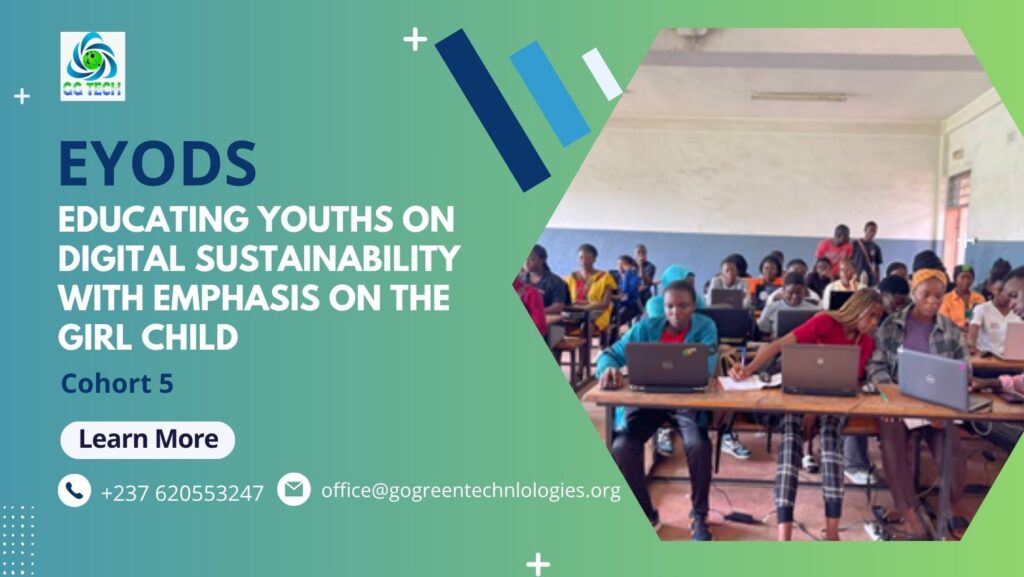1. Overview
Educating Youths on Digital Sustainability with Emphasis on the girl child (EYODS) Cohort 5 project ran from May 25- June 15, 2025, offering digital skills training to Cameroonian youth with emphasis on empowering the girl child. The four-week hybrid training covered:
- General Computer
- Graphic Design
- Social Media Management
- Web Design (WordPress)
A preliminary orientation seminar on May 25 introduced expectations and resource requirements. (Documented separately.)

2. Engagement and Interest Analysis
A significant indicator of interest in the program was observed through our outreach campaign:
| Platform/Group | Youths Engaged |
| WhatsApp Cohort 5A | 864 |
| WhatsApp Cohort 5B | 146 |
| Total Expressed Interest | 1,010 |
Interpretation: Over 1,000 young people demonstrated interest, reflecting strong digital education demand and successful outreach. Meanwhile 32.2% of those who expressed interest proceeded to formal registration (325 participants), highlighting potential barriers such as access, timing, or resource limitations.

3. Participant Registration Overview
| Course | Total Registered | Boys (71.4%) | Girls (28.6%) |
| Web Design | 78 | 56 | 22 |
| General Computer | 95 | 68 | 27 |
| Social Media Management | 61 | 44 | 17 |
| Graphic Design | 91 | 65 | 26 |
| Total | 325 | 232 | 93 |
Interpretation; General Computer and Graphic Design saw the highest interest, making up 57.2% of registrations. Girls represented 71.4% of all registrants; a major success considering the project’s emphasis on empowering the girl child. The strong representation of girls across all courses shows effective gender inclusion and project relevance for young women.
3. Course-by-Course Analytics
A. General Computer:Strong demand and female completion. Covered core productivity tools essential for jobs and self-employment.
- Registered: 95 (68 girls, 27 boys)
- Certified: 14 (10 girls, 4 boys)
- Tutor: Ms. Shey Tabitha

B. Graphic Design:Highest course completion. Strong female performance (78.2%). Covered branding, Photoshop, Illustrator.
- Registered: 91 (65 girls, 26 boys)
- Certified: 23 (18 girls, 5 boys)
- Tutor: Mr. Joko Cedrick

C. Web Design (WordPress): Lowest female completion (25%). Tutor emergency impacted continuity. Highlights need for backup planning.
- Registered: 78 (56 girls, 22 boys)
- Certified: 12 (3 girls, 9 boys)
- Tutors: Mr. Ayompe Joel, Mr. Awejan Emmanuel (substitute)

D. Social Media Management: Practical and accessible course. Prepares youth for freelance and online content opportunities.
- Registered: 61 (44 girls, 17 boys)
- Certified: 13 (9 girls, 4 boys)
- Tutor: Ms. Ngonge Meiva

4. Completion and Certification Summary
Participants were certified based on:
- Full attendance from May 15 – June 15, 2025
- Completion of all assigned tasks
| Course | Boys | Girls | Total | % of Total Certified |
| General Computer | 4 | 10 | 14 | 20.6% |
| Graphic Design | 5 | 18 | 23 | 33.8% |
| Web Design | 9 | 3 | 12 | 17.6% |
| Social Media Management | 4 | 9 | 13 | 19.1% |
| Total | 22 | 40 | 62 | 100% |
4. Engagement Funnel Summary: Interest-to-registration conversion reflects enthusiasm but also barriers like access, scheduling, or device constraints.

5. General Participation Overview
| Category | Girls | Boys | Total |
| Expressed Interest | Not gender-disaggregated | Not gender-disaggregated | 1,010 |
| Registered Participants | 232 (71.4%) | 93 (28.6%) | 325 |
| Certified Graduates | 40 (64.5%) | 22 (35.5%) | 62 |
| Course Completion Rate | 17.2% (40/232) | 23.7% (22/93) | 19.1% |
6. Operational Insights
- Tutor Substitution: Emergency absence in Web Design led to Mr. Awejan Emmanuel stepping in. Future cohorts need planned tutor backups.
- Facilitator Support: Tutors showed strong commitment. Formal compensation and recognition would boost sustainability and morale.
7. Recommendations
- Introduce Tutor Backup Pool: Avoid session disruption during emergencies.
- Compensate & Recognize Tutors: Include stipends and public recognition.
- Increase Retention: Use mid-program check-ins, onboarding, and support incentives (data, transport).
- Extend Impact via Mentorship: Offer post-cohort challenges, internships, or alumni projects.
8. Innovation
Extend Impact via Mentorship: Students who completed the training will be given the opportunity of mentorship at GG TECH Mentorship program; from there, they will go forward to do internship at partner institutions to solidify their skills making them job ready and character ready.

Acknowledgments
We wish to express our sincere appreciation to our partners whose support and collaboration have been vital to the success of this project.
Special thanks to:
Their contribution has been instrumental in achieving our objectives and promoting community development.










Project Manager: Awejan Emmanuel
Project Coordinator: Ngonge Meiva
Resource Manager: Mapong Louise
Learn more about GoGreen Technologies
Contact us Here
Or you can Join forces with us
